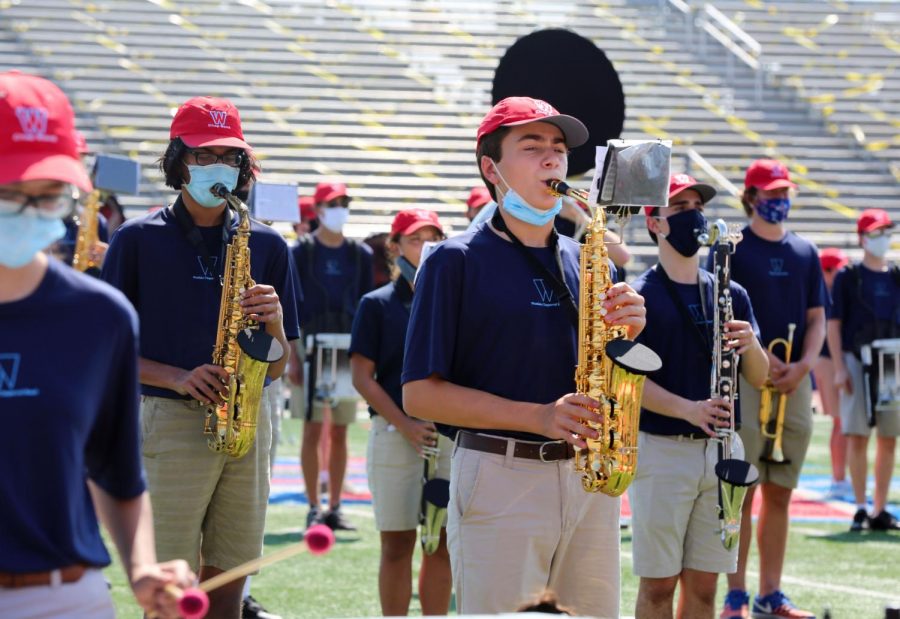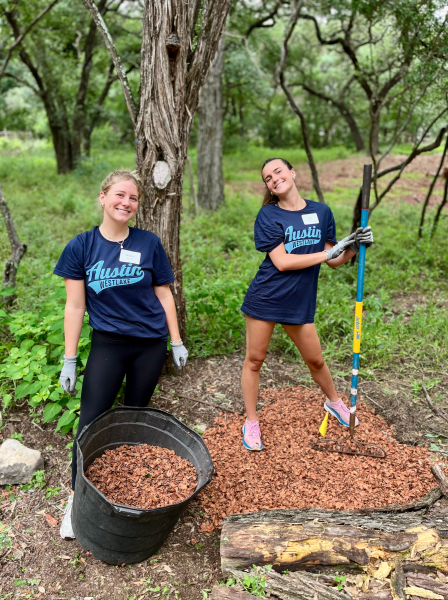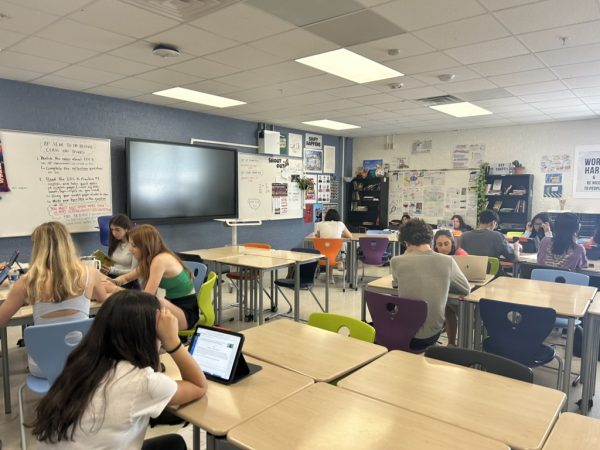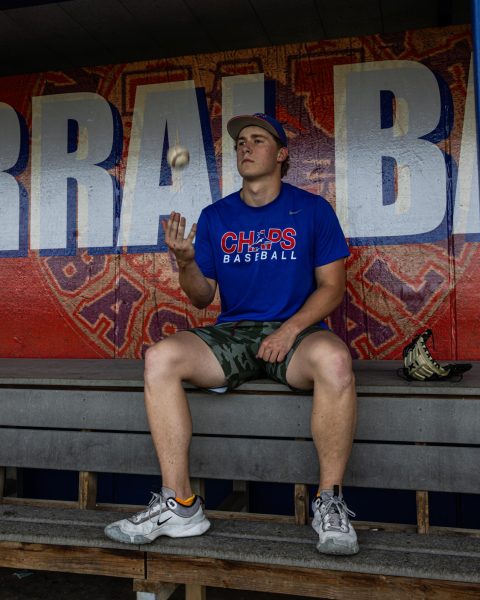Westlake Chaparral Marching Band overcomes challenges, changes presented by pandemic
As Westlake Chaparral Marching Band rehearsal begins, there is a noticeable shift in energy from previous years. Members cannot run wildly onto the field as they could before. Instead, they must stay in their designated areas on the field until they are instructed to move to their spots in small groups. They cannot hang out between playing because they must maintain distance from each other. However, during rehearsal, they are attentive and dedicated to listening to the directors’ feedback to improve their performance. They still loudly cheer for their fellow members. Although rehearsal seems very different this year, one thing that hasn’t changed is the band members’ enthusiasm and passion.
“I’m still happy to go to rehearsal every day — or whenever we have rehearsal,” piccolo player junior Elizabeth Payne said. “I have to say, [COVID-19] has changed the way rehearsal has been structured, but it hasn’t changed my attitude towards it.”
Marching band began practicing in person Sept. 8, the first day students could return to the building. To meet safety protocols, the full band practices Monday mornings and Tuesday and Thursday afternoons, with individual sections having their own rehearsals throughout the week.
“It’s going great so far,” director of bands Kerry Taylor said. “The students have been phenomenal with their COVID-19 protocol awareness. They are learning quickly, they are working hard, they’re enthusiastic. They’re happy to be here, as I am too. The alternative is that we’re not here, and we’re not doing this, so I’ve been very pleased with where we are and where we’re headed.”
Rehearsal looks different due to the safety guidelines marching band must follow. The drill is more spaced out to ensure that members can follow social distancing guidelines. Masks are mandatory when not playing. Some members wear modified masks that allow them to play while wearing a mask, while others have to pull their masks down to play. Certain instruments have bell covers to prevent aerosol particles from escaping as members play. Members must bring their own water, and they must maintain distance from each other.
“I feel pretty safe,” sousaphone player senior Jack Hagan said. “Our directors put a lot of effort and thought into making sure that we’re all following the guidelines and making smart decisions about whether or not we should be practicing.”
In fact, according to Elizabeth, some of these guidelines have a very minimal impact on the marching band’s performance.
“[Using bell covers] actually doesn’t have that much of an effect on our playing, especially when the sound is already muffled from being out on a field rather than in a room with proper sound adjustments,” Elizabeth said. “Out on the field, the sound quality is [worse] anyway, and I don’t notice a difference between sounds without bell covers and sounds with bell covers. It’s a good safety precaution without [many] drawbacks. I feel much safer at rehearsal than I actually do in school due to the enforced social distancing.”
In addition, this year the marching band did not hold tryouts. Instead, students in the band program simply had to opt in or out. Students could opt in regardless of whether or not they were in-person at school, and students who opted out still learn the show music and participate during band class, but they don’t attend rehearsal. They also must complete alternate assignments to make up for missing things like football games.
“Honestly the big tryout this year was, ‘Do you want to participate?’” Taylor said. “We knew we were going to have fewer sets that we had to learn, and we knew that the amount of time of our performance was going to be shortened, so we knew that the demand on each individual was going to be less than it normally is. We opened it up to everybody. Anybody that wanted to come in and participate, we were going to have a spot for them to do that.”
Tuba player junior Annabelle Borm is one of the students who decided to opt out of in-person marching band.
“It’s just been kind of weird because a big part of band is talking and hanging out with your section, and I’m missing most of that this year,” Annabelle said. “But I do like that I have more time to practice, and it’s kind of strange to try to march correctly on Zoom.”
These changes have forced the band to prepare a less complex show than in previous years. The show has been shortened and mainly consists of music the band has played before as a celebration of the band’s history.
“In the past, it’s been kind of hard to learn all the music in such a short amount of time, especially because we have to memorize it too,” Elizabeth said. “And then also with the marching aspect, it just makes everything really difficult with junior year especially [because of] all this extra schoolwork and homework. For me at least, having this less complex thing is a bit of a relief.”
Seniors Jordan Spradley, Katie Denton, Jackson Weise and Jenna May are the four drum majors, and their job is to conduct the band at the front. As a drum major, Jenna experiences these changes differently than those who march on the field.
“For me, [following safety guidelines] is not that much different than other people,” Jenna said. “I’m just like normal people not in the band because I don’t play so I just can wear my masks the entire time. My podium is actually 6 feet tall. So, the closest anyone could possibly be to me is 6 feet. When you’re making corrections, whether it be on drill or marching or posture, [before] you could go up and fix them. But now, you kind of have to mirror them, and then fix it on yourself and then they fix it. It’s definitely different how you fix people just because you can’t get close. And there’s a lot of details that are hard to correct when you’re kind of far away.”
However, despite these changes, a large part of marching band remained the same.
“Other than us having to spend quite a bit of time talking about the protocols we have in place for physical distancing and supplying your own water, we haven’t changed our expectations or our actual instruction about the actual music or marching part of things,” Taylor said.
Furthermore, Taylor said he has been pleased with the band’s compliance with these regulations.
“I think we all feel like we’re in this together, and we want this to be successful,” Taylor said. “We want to be able to continue doing what we do. And we all realize if that’s going to happen, then we all need to observe the guidelines that are recommended by CDC and other folks.”
Inevitably, these new guidelines present unique and unprecedented challenges in terms of marching, playing and performing.
“It’s more of just how we can adapt to the new challenges, while still making the best product possible because there’s so much new, and it’s really hard to focus on improving rather than just responding to those challenges,” Jenna said. “I don’t want this to be a good year for COVID, I just want this to be a good year in general.”
One of the biggest challenges for marching band this year was band camp in the summer. At band camp, the marching band works on marching fundamentals. Usually, they hold tryouts after the first week to determine the varsity team and then begin work on the marching show. For freshmen, band camp helps them learn the basics of marching band and incorporates them into the rest of the band. This past summer, band camp took place virtually.
“The entire thing of marching band is [that] it’s a very physical thing, and it’s hard to do over Zoom,” Elizabeth said. “It’s like asking somebody to play football over Zoom; it’s almost not possible. I think it was just a struggle for everybody to adjust to online marching band. When we went back in person on the first week of school, it was much better.”
This was especially a challenge for freshmen new to marching band, as they had no previous knowledge of marching technique. For freshman Rohan Basu Roy, who plays the snare on battery, marching is the most difficult part.
“I think if I did have band camp, I would’ve been a much better marcher than I am now,” Rohan said. “Everything wouldn’t be so rushed, like having to learn how to march a chunk in the music and then three days later learning how to march it and play it for a football game.”
Rohan feels that COVID-19 has ruined his freshman year marching band experience.
“Because of COVID, there are no competitions, I can’t go to the away football games, I can’t interact with other sections and this season hasn’t been normal at all,” Rohan said.
Veteran marching band members like Jack, Elizabeth and Jenna recognize the unique challenges that freshmen face this year. Because of this, they hope to make freshmen feel welcome however they can.
“I plan to try to get to know all of the freshmen,” Elizabeth said. “We have a band sibling program with big siblings and little siblings. My little sibling isn’t [doing] in person marching band, she’s still online. So, unfortunately I’m not able to get to know her in person. But I am able to get to know other freshmen. I just try to get to know the freshmen and bond with them.”
Jenna appreciates the members who help lead the freshmen, even if they aren’t officially named leaders themselves.
“I feel like the biggest leaders are just the people that are really participating as much as they can,” Jenna said. “We still have some freshmen that are counting super quiet or are not playing while they’re marching. Just everyone around them, like the upperclassmen that are participating as much as they can, are really helping set an example and define this standard that we have. It’s just really nice that we have so many people that while not named leaders, they’re being followed, so they are leaders.”
The marching band played at their first football game of the year Sept. 25. They were not prepared to perform their marching show, so they just played in the stands.
“[Playing at the football game] was amazing,” Jenna said. “Football games are one of the funnest things about marching band. I don’t really think that the freshmen were 100% prepared because there is kind of a craziness with band. We’re a little wild and there are a bunch of weird traditions that we have that the freshmen don’t always understand. But it was so nice to just be back there and still do the officer exchange and freaking out if someone was single. It felt kind of normal. Obviously, we’re in a different place and we had masks and there’s distancing, but we were still together and football games are just so fun.”
According to Jenna, the unique circumstances surrounding practices and performances this year have led to a newfound gratefulness for marching band.
“I think people really appreciate what we’re doing a lot more,” Jenna said. “Normally we have a band camp and it’s hot and it’s outside, and everyone complains about Tuesday afternoon rehearsals because they’re hot and they’re late, but now everyone is just really happy to be there and to be with their friends and to be doing marching band.”
Although marching band looks different from before, most members appreciate having the opportunity to perform with their fellow band members in spite of this year’s challenges.
“I’m just glad that I can be in person for these rehearsals and see my section,” Jack said. “I know that they all want to enjoy their high school, and not seeing each other for a really long time was a huge bummer for a lot of people. Just being in person with each other for these rehearsals and working together collectively and talking to each other and being around each other, even if it’s not nearly as much as we usually are; I think it’s something that everyone really enjoys.”









